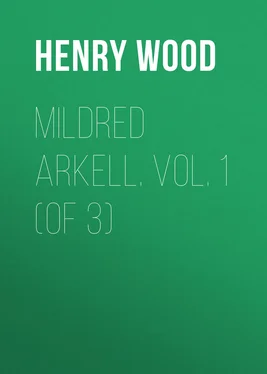Henry Wood - Mildred Arkell. Vol. 1 (of 3)
Здесь есть возможность читать онлайн «Henry Wood - Mildred Arkell. Vol. 1 (of 3)» — ознакомительный отрывок электронной книги совершенно бесплатно, а после прочтения отрывка купить полную версию. В некоторых случаях можно слушать аудио, скачать через торрент в формате fb2 и присутствует краткое содержание. Жанр: foreign_sf, literature_19, foreign_antique, foreign_prose, на английском языке. Описание произведения, (предисловие) а так же отзывы посетителей доступны на портале библиотеки ЛибКат.
- Название:Mildred Arkell. Vol. 1 (of 3)
- Автор:
- Жанр:
- Год:неизвестен
- ISBN:нет данных
- Рейтинг книги:4 / 5. Голосов: 1
-
Избранное:Добавить в избранное
- Отзывы:
-
Ваша оценка:
- 80
- 1
- 2
- 3
- 4
- 5
Mildred Arkell. Vol. 1 (of 3): краткое содержание, описание и аннотация
Предлагаем к чтению аннотацию, описание, краткое содержание или предисловие (зависит от того, что написал сам автор книги «Mildred Arkell. Vol. 1 (of 3)»). Если вы не нашли необходимую информацию о книге — напишите в комментариях, мы постараемся отыскать её.
Mildred Arkell. Vol. 1 (of 3) — читать онлайн ознакомительный отрывок
Ниже представлен текст книги, разбитый по страницам. Система сохранения места последней прочитанной страницы, позволяет с удобством читать онлайн бесплатно книгу «Mildred Arkell. Vol. 1 (of 3)», без необходимости каждый раз заново искать на чём Вы остановились. Поставьте закладку, и сможете в любой момент перейти на страницу, на которой закончили чтение.
Интервал:
Закладка:
Mrs. Dan Arkell gave her head a shake, as if she were not so sure upon the latter point as her nephew. Prudent age—impulsive youth: how widely different do they judge of things! William was turning to the door.
"You are not going?" said Mrs. Dan, and Mildred looked up from her work, a yearning wistfulness in her eye.
"I must, this evening; I asked young Monk to come in and bring his violin, and he'll be waiting for me, if I don't mind. Good-bye, Aunt Dan; pleasant dreams to you, Mildred!"
But as William went out, he opened the door of Peter's study, and stood there gossiping at least twenty minutes. He might have stood longer, but for the sight of two gentlemen who were passing along the road arm-in-arm, and he rushed out impulsively, forgetting to say good-evening to Peter.
CHAPTER II.
THE MISS HUGHES'S HOME
Marmaduke Carr, of whom mention has been made, was one of the Westerbury manufacturers—a widower, and a wealthy man. He had only one son living—Robert; two other children had died in infancy. Robert Carr, about thirty years of age now, was not renowned for his steadiness of conduct; indeed, he had been a sad spendthrift, and innumerable unpleasant scenes had resulted therefrom between him and his father. It could not be said that his heart was bad; but his head was certainly light. Half the town declared that Robert Carr had no real evil in him; that his faults were but the result of youth and carelessness; that he would make a worthy man yet. The other half prophesied that he would be safe to come to a bad ending, like wicked Harry in the spelling-book. One of his escapades Mr. Carr was particularly sore upon. After a violent quarrel between them—for each possessed a temper of his own—Robert had started off clandestinely; that is, without saying a word to anyone. At the end of a month he returned, and bills to the amount of something like a hundred pounds came in to his father. Mr. Robert had been seeing life in London.
In one sense of the word, the fault was Mr. Carr's. There cannot be a greater mistake than to bring up a son to idleness, and this had been the case with Robert Carr. He would settle to nothing, and his father had virtually winked at it. Ostensibly, Robert had entered the manufactory; but he would not attend to the business: he said he hated it. One day there, and the other five days away. Idling his hours with his friends in the town; over at his uncle's, Squire Carr's, shooting, fishing, hunting; going somewhere out by the morning coach, and in again; anything, in fact, to avoid work and kill time. This should have been checked in the onset; it was not, and when Mr. Carr awoke to the consequences of his indulgent supineness, the habits had grown to a height that refused control. "Let him take his pleasure a bit," Mr. Carr had said to his own heart at first, "youth's never the worse for a little roaming before settling down. I have made plenty of money, and there's only Bob to inherit it." Dangerous doctrine; mistaken conclusions: and Mr. Carr lived to find them so.
Squire Carr was his elder brother. He was several years older than Marmaduke. He possessed a small property, and farmed it himself, and was consequently called "Squire" Carr—as many of those small landed proprietors were called by their neighbours in the days now passing away. Squire Carr, a widower of many years, had one son only—John. This John had made a marriage almost in his boyhood, and had three children born to him—Valentine, Benjamin, and Emma, and then his wife died. Next he married a second wife, and after some years she died, leaving several young children. They all lived with the squire, but the three elder children were now nearly grown up. It was to this house, and to see these younger children, that Mrs. Dan Arkell purposed going, if she could borrow Mr. Arkell's carriage. They lived about eight miles off, near to Eckford, a market town. By the coach road, indeed, it was considerably more.
Squire Carr and his brother were not very intimate. The squire would ride into Westerbury on the market day, or drive in with his son in the dogcart, but not once in three months did they call at Marmaduke's. There was no similarity between them; there was as little cordiality. The squire was of a grasping, mean, petty nature, and so was his son after him. Marmaduke was open-handed and liberal, despising meanness above every earthly failing.
Robert Carr had plunged into other costly escapades since that first one of the impromptu sojourn in London, and his father's patience was becoming exhausted. Latterly he, Robert, had struck up an acquaintance with a young girl, Martha Ann Hughes; and there is no doubt that this vexed Mr. Carr more than any previous aggression had done. The Carrs, in their way, were proud. They were really of good family, and in the past generation had been of some account. A horrible fear had taken hold of Mr. Carr, that Robert, in his infatuation, might be mad enough to marry this girl, and he would have deemed it the very worst calamity that could fall upon his life.
For Robert was seen with this girl in public, and the girl and her family were, in their station, respectable people; and the other evening, when Mr. Carr had spoken out his mind in rather broad terms, Robert had flown in a passion, and answered that he'd "shoot himself rather than hurt a hair of her head." The fear that he might marry her entered then and there into Mr. Carr's head; and it grew into a torment.
The two gentlemen, passing Mrs. Dan Arkell's house as William flew out, were Robert Carr and a young clergyman with whom he was intimate, the Reverend John Bell. Mr. Bell had had escapades of his own, and that probably caused him to tolerate, or to see no harm in, Robert Carr's. Certain it is they were firm, almost inseparable friends; and rumour went that Mr. Bell was upon visiting terms at Miss Hughes's house, introduced to it by Robert. The Reverend John Bell had had his first year's curacy in Westerbury; he was now in priest's orders, hoping for employment, and, meanwhile, helping occasionally in the services at a church called St. James-the-Less, whose incumbent, one of the minor canons, had fits of gout.
William joined them. He did not say anything to Robert Carr then, in the presence of Mr. Bell; but he did intend, the first opportunity, to recommend him to drop the affair as profitless in every way, and one there seemed to be trouble over. They walked together to the end of the old cathedral outer wall, and there separated. William turned to the left, which would lead him to his home; while Mr. Bell passed through a heavy stone archway on the right, and was then within the precincts of the cathedral, in a large open space, surrounded by the prebendal and other houses; the deanery, the cloisters, and the huge college schoolroom being on one side. This was the back of the cathedral; it rose towering there behind the cloisters. Mr. Bell made straight for the residence of the incumbent of St. James-the-Less, the Reverend Mr. Elwin—a little old-fashioned house, with no windows to speak of, on the side opposite the deanery.
Robert Carr had turned neither to the right nor the left, but continued his way straight on. Passing an old building called the Palmery—which belonged, as may be said, to the cathedral—he turned into a by-street, and in three or four minutes was at the end of the houses on that side the town. Before him, at some little distance, in the midst of its churchyard, stood the church of St. James-the-Less, surrounded by the open country. The only house near it, a poor little dwelling, was inhabited by the clerk. That is, it had been inhabited by him; but the man was now dead, and a hot dispute was raging in the parish whether a successor should be appointed to him or not. Meanwhile, the widow benefited, for she was allowed to continue in the house until the question should be settled.
Читать дальшеИнтервал:
Закладка:
Похожие книги на «Mildred Arkell. Vol. 1 (of 3)»
Представляем Вашему вниманию похожие книги на «Mildred Arkell. Vol. 1 (of 3)» списком для выбора. Мы отобрали схожую по названию и смыслу литературу в надежде предоставить читателям больше вариантов отыскать новые, интересные, ещё непрочитанные произведения.
Обсуждение, отзывы о книге «Mildred Arkell. Vol. 1 (of 3)» и просто собственные мнения читателей. Оставьте ваши комментарии, напишите, что Вы думаете о произведении, его смысле или главных героях. Укажите что конкретно понравилось, а что нет, и почему Вы так считаете.












